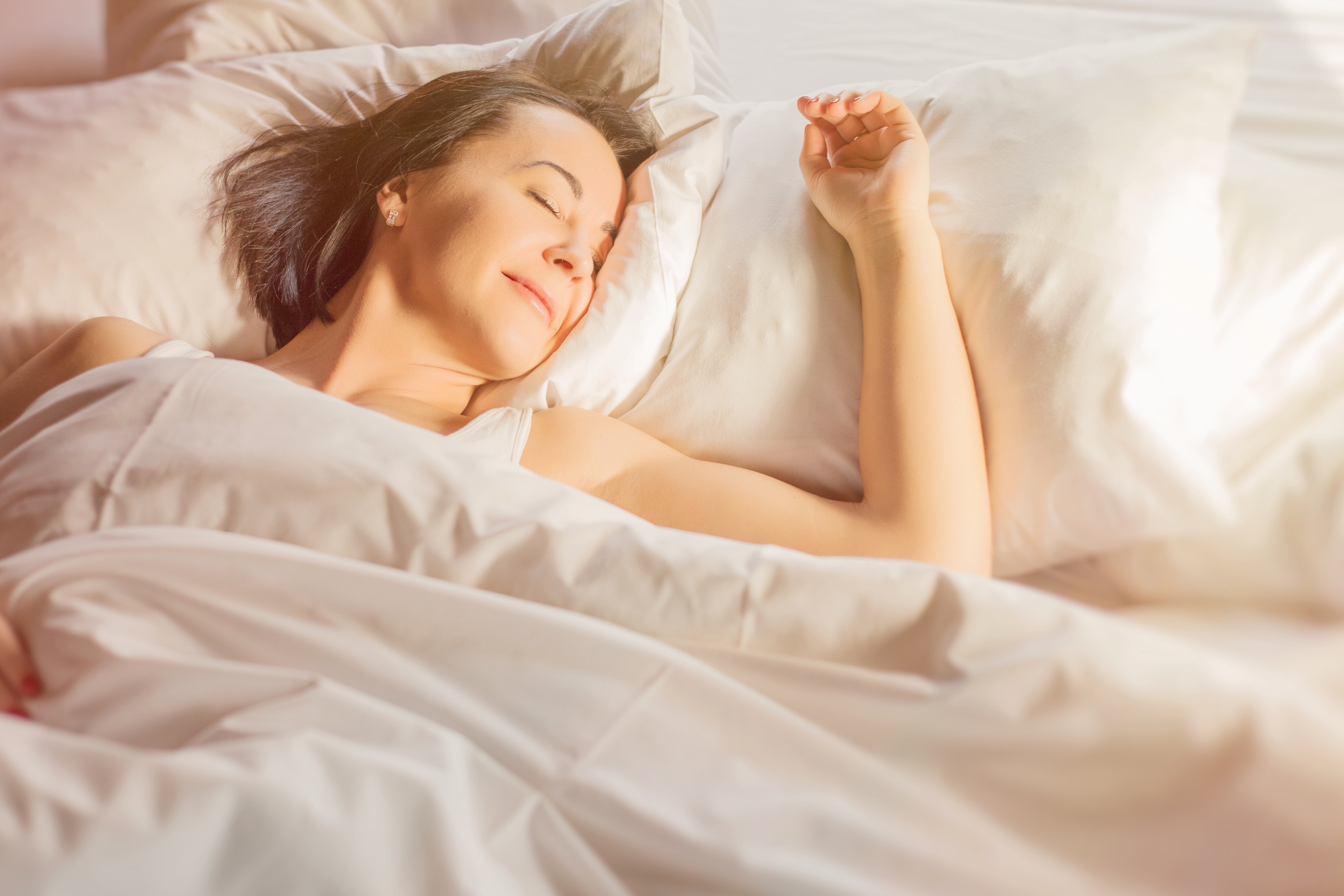
Dreaming of better sleep? Read this.
Ah, sleep — that elusive, rejuvenating state we all crave after a long day. Yet, for many, achieving quality rest feels more like a distant dream than a nightly reality. Sleep disturbances are particularly common during perimenopause and menopause, making this crucial aspect of health even more challenging. Understanding why sleep disturbances occur, their impact on your health, and how to manage them can lead to more restful nights and brighter days. Let’s delve into the causes of sleep issues during this transitional period and explore effective strategies for reclaiming your rest.
Why Sleep Disruptions Occur During Perimenopause and Menopause
As women transition through perimenopause and menopause, several factors contribute to sleep disturbances:
1. Hormonal Fluctuations The decline in estrogen and progesterone levels during perimenopause and menopause can significantly impact sleep. Estrogen influences the regulation of the sleep-wake cycle, while progesterone has a calming effect that helps maintain restful sleep. The decrease in these hormones can lead to difficulties falling and staying asleep and they can start falling even 10 years before your last period.
2. Hot Flashes and Night Sweats Hot flashes and night sweats are hallmark symptoms of menopause that can disrupt sleep. These sudden, intense feelings of heat can wake you up frequently throughout the night, preventing you from reaching the deeper, restorative stages of sleep.
3. Anxiety and Mood Swings Hormonal changes can also lead to increased anxiety and mood swings. Elevated stress and anxiety levels can make it harder to relax and fall asleep, leading to fragmented and unrestful nights.
4. Sleep Disorders Conditions such as sleep apnea, which can become more common with age, may also affect sleep quality. The interruptions in breathing can lead to frequent awakenings and reduced overall sleep quality.
5. Physical Discomfort Joint pain, muscle aches, and other physical discomforts that often accompany aging and hormonal changes can also interfere with sleep.
6. Diet and Lifestyle Choices: Caffeine late in the day, heavy meals before bed, and lack of physical activity can all sabotage sleep quality.
The Consequences of Poor Sleep
A bad night’s sleep can ripple through your entire day, impacting both mental and physical health:
1. Mental Health Chronic sleep disturbances can exacerbate anxiety and depression, reduce cognitive function, and impair memory and concentration. The lack of restorative sleep prevents your brain from properly processing and organizing information, affecting your mood and mental clarity.
2. Physical Health Inadequate sleep can lead to a range of physical health issues, including increased risk of cardiovascular disease, weight gain, and weakened immune function. During menopause, sleep problems can exacerbate symptoms like fatigue and decreased energy levels.
3. Daily Functioning Poor sleep affects your ability to perform daily tasks, leading to reduced productivity, increased irritability, and diminished overall quality of life.
Effective Strategies for Improving Sleep
1. Hormone Replacement Therapy (HRT) HRT can help alleviate menopausal symptoms, including sleep disturbances, by restoring hormonal balance. Consult with your healthcare provider to determine if HRT is appropriate for you. Women in early perimenopause can benefit from the addition of progesterone, and women in late perimenopause or post menopause can benefit from both estrogen and progesterone replacement.By addressing hormonal imbalances, estrogen therapy can reduce hot flashes and night sweats, which often disrupt sleep.
2. Progesterone Progesterone has a calming effect that can aid in improving sleep quality. Speak with your healthcare provider about the potential benefits of progesterone supplements for sleep disturbances.
3. Magnesium Bisglycinate Magnesium plays a key role in relaxation and sleep regulation. Magnesium bisglycinate is a highly absorbable form that can help improve sleep quality and reduce muscle tension.
4. Create a Relaxing Bedtime Routine Establish a calming pre-sleep routine, such as reading, taking a warm bath, or practicing relaxation techniques to signal your body that it’s time to wind down.
5. Maintain a Consistent Sleep Schedule Going to bed and waking up at the same time every day helps regulate your internal clock and improves overall sleep quality.
6. Optimize Your Sleep Environment Ensure your bedroom is quiet, dark, and cool. Invest in a comfortable mattress and pillows to support restful sleep.
7. Limit Screen Time Before Bed Reduce exposure to blue light by turning off electronic devices at least an hour before bedtime.
8. Watch Your Diet Avoid heavy meals, caffeine, and alcohol close to bedtime. Opt for a light snack if you’re hungry.
9. Stay Active Regular physical activity promotes better sleep, but avoid vigorous exercise close to bedtime.
10. L-Theanine: Found in green tea, it promotes relaxation without drowsiness.
11. Valerian Root: Often used in herbal teas, this plant can help you fall asleep faster and enjoy better quality rest.
12. Melatonin: A natural hormone that can help regulate sleep cycles.
More Prescription Non-Controlled Medications for Insomnia
Gabapentin Gabapentin, often used to manage nerve pain, has also been found to help with hot flashes, reduce anxiety and improve sleep quality in some individuals. It’s one of the most used non-hormonal strategies for the relief of symptoms of perimenopause and menopause.
Trazodone Trazodone is an antidepressant that is frequently prescribed off-label for its sedative effects. It can help with sleep initiation and maintenance, particularly in patients who also have depression or anxiety.
Doxepin Doxepin is a tricyclic antidepressant with strong antihistaminic properties, making it effective for sleep maintenance. It is prescribed at low doses specifically for treating insomnia.
Suvorexant (Belsomra) Suvorexant is an orexin receptor antagonist that helps regulate the sleep-wake cycle. It is prescribed for patients with difficulty falling and staying asleep.
Lemborexant (Dayvigo) Lemborexant is another orexin receptor antagonist that helps with both sleep onset and maintenance. It is used to manage insomnia in adults and is known for its efficacy and relatively favorable side effect profile.
Ramelteon (Rozerem) Ramelteon is a melatonin receptor agonist that mimics the effects of melatonin, a hormone that regulates sleep. It is used for sleep onset insomnia and is considered to have a low risk of dependence.
Amitriptyline Amitriptyline is a tricyclic antidepressant that is sometimes used off-label to treat insomnia, particularly when associated with depression. It has sedative properties that can help with both sleep onset and maintenance.
Mirtazapine (Remeron) Mirtazapine is an antidepressant with sedative effects. It can be helpful for individuals with insomnia, especially when accompanied by mood disorders. It promotes sleep by increasing serotonin and norepinephrine levels in the brain.
Remember, it’s important to consult with a healthcare provider before adding any supplements or medications to your routine, to ensure they’re right for you and won’t interact with any medications you may be taking.
Embrace Restful Sleep for a Healthier You
Addressing sleep disturbances during perimenopause and menopause is crucial for maintaining overall health and well-being. By understanding the causes of sleep disruptions and implementing effective strategies, you can improve both the quality of your sleep and your quality of life. For personalized advice and treatment options, don’t hesitate to consult with a healthcare provider. Together, we can work towards achieving restful, restorative sleep and a brighter, more energized life.
FAQs About Sleep and Menopause
Q: How can I manage hot flashes that disrupt my sleep?
A: Hormone replacement therapy, or non-hormonal interventions like gabapentin, and lifestyle adjustments like keeping your bedroom cool can help manage hot flashes and improve sleep.
Q: Can supplements help with sleep during menopause?
A: Yes, supplements like magnesium bisglycinate may improve sleep quality. Always consult with your healthcare provider before starting any new supplements.
Q: What should I do if I still can’t sleep despite trying these strategies?
A: Persistent sleep issues may require further evaluation by a healthcare provider to address underlying causes and explore additional treatment options.
Q: Are naps good or bad for sleep?
A: Short naps (20-30 minutes) can be beneficial, especially for those not getting enough nighttime sleep. However, long or late naps can interfere with nighttime sleep patterns.
Q: How much sleep do I really need?
A: While individual needs may vary, most adults benefit from 7-9 hours of quality sleep per night.
Sweet dreams and restful nights await with the right strategies and support. Embrace these tips and let the journey to better sleep begin!



